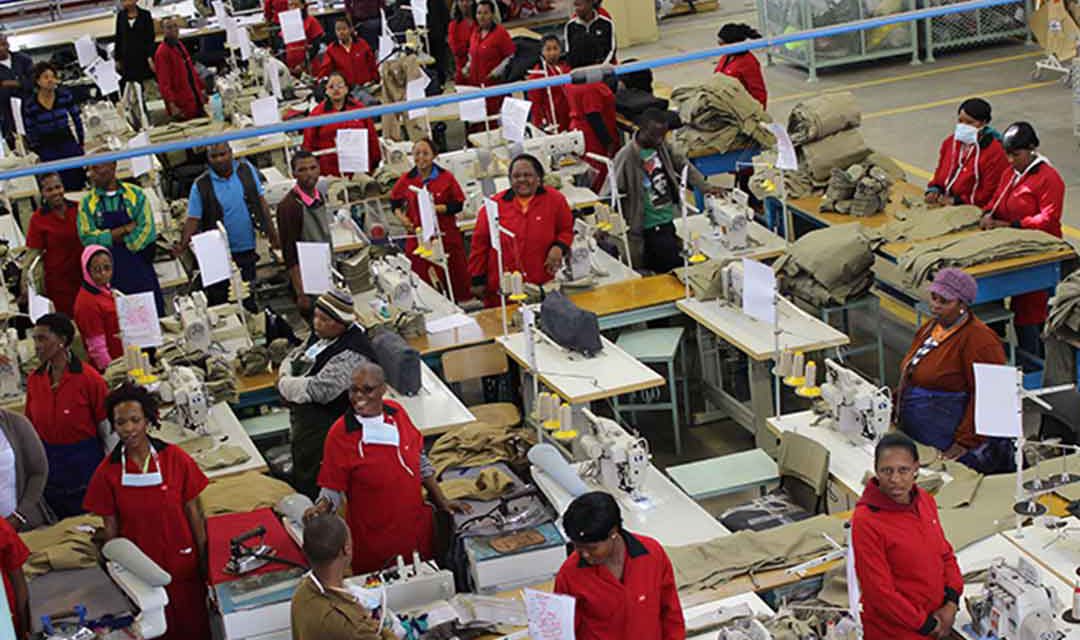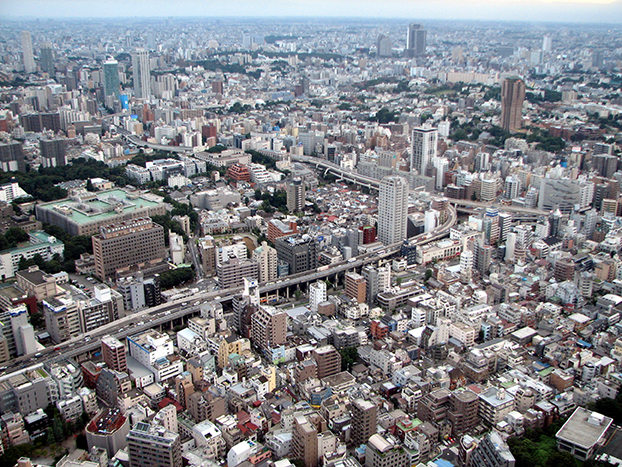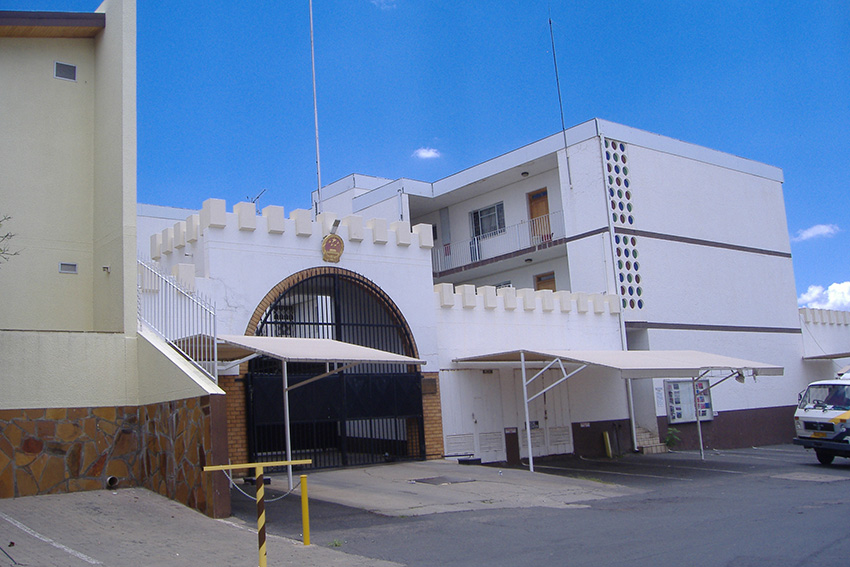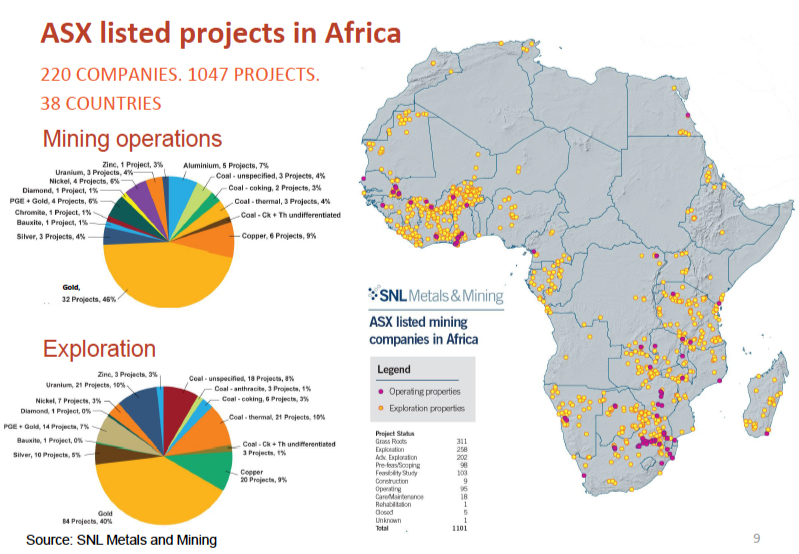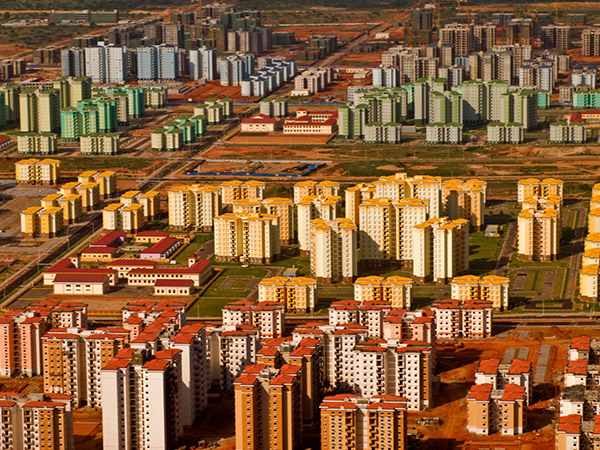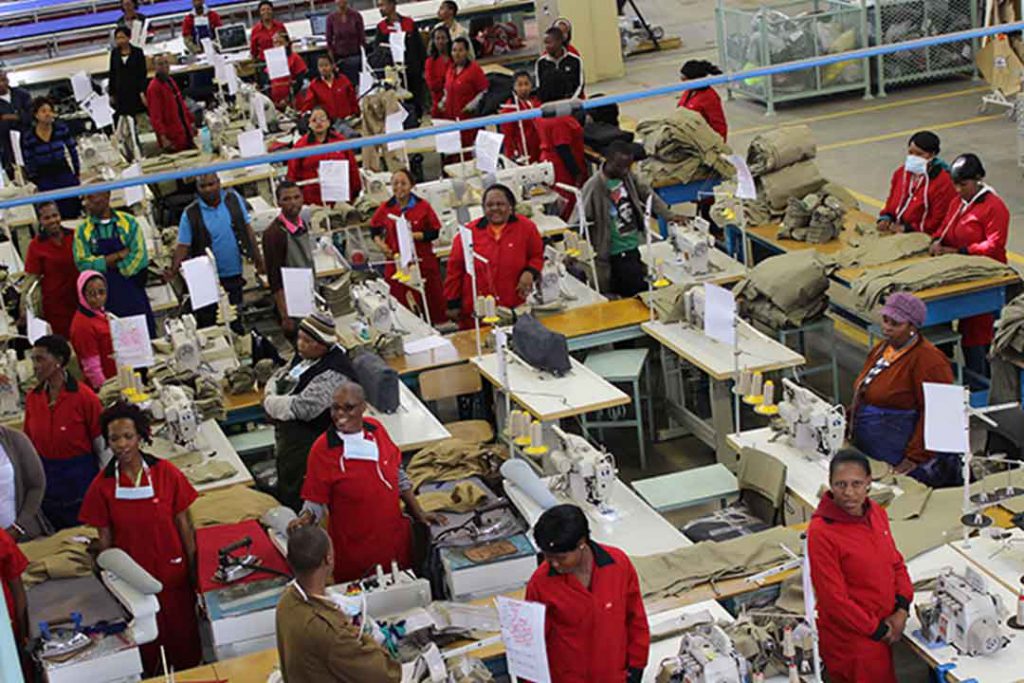
Johnson Manufacturing workers knitting overalls in the Maputsoe Industrial Area. Image Sechaba Mokhethi
Chinese and Taiwanese textile and apparel factory owners have exploited an AGOA loophole, creating jobs in Lesotho, but still funnel most profits back home
Taiwanese and Chinese immigrants have brought jobs to Lesotho’s ailing economy – these investors have created an estimated 40,000 direct jobs in the textile and apparel industry. It is against this backdrop that ‘Marethabile Molato left the rural areas of Mantšonyane in 1998, travelling about 200 km to seek employment in the kingdom’s capital city, Maseru.
Despite having no skills she was employed by a Taiwanese-owned company, which produced jeans, in the Thetsane Industrial Area. She received training on stitching seams on jeans and this has been her sole task for the past 19 years. “What I am doing now is the only thing that I know. I would prefer learning to sew a complete pair of trousers so that I would be able to start my own business upon exiting the factories,” Molato tells Africa in Fact.
She earns R1,360 each month, which has to cover her son’s school fees, transport, food, rent and other basics. Molato says she has no choice but to work at the factory because she can’t find alternative employment. She is also worried about her health, saying the workers spend more than 10 hours each day standing on bare cement floors in the cold factory shells, where there is no heating. “We also have to endure working in a too congested environment, very hot in summer due to lack of proper ventilation and air conditioning and we consistently inhale dust.”
Dr Llang Maama, a programme manager at the National Tuberculosis Controllers Association, ascribes the high rates of lung infections among factory employees to their work environment. Molato fears she could fall ill too if she can’t find a way out.
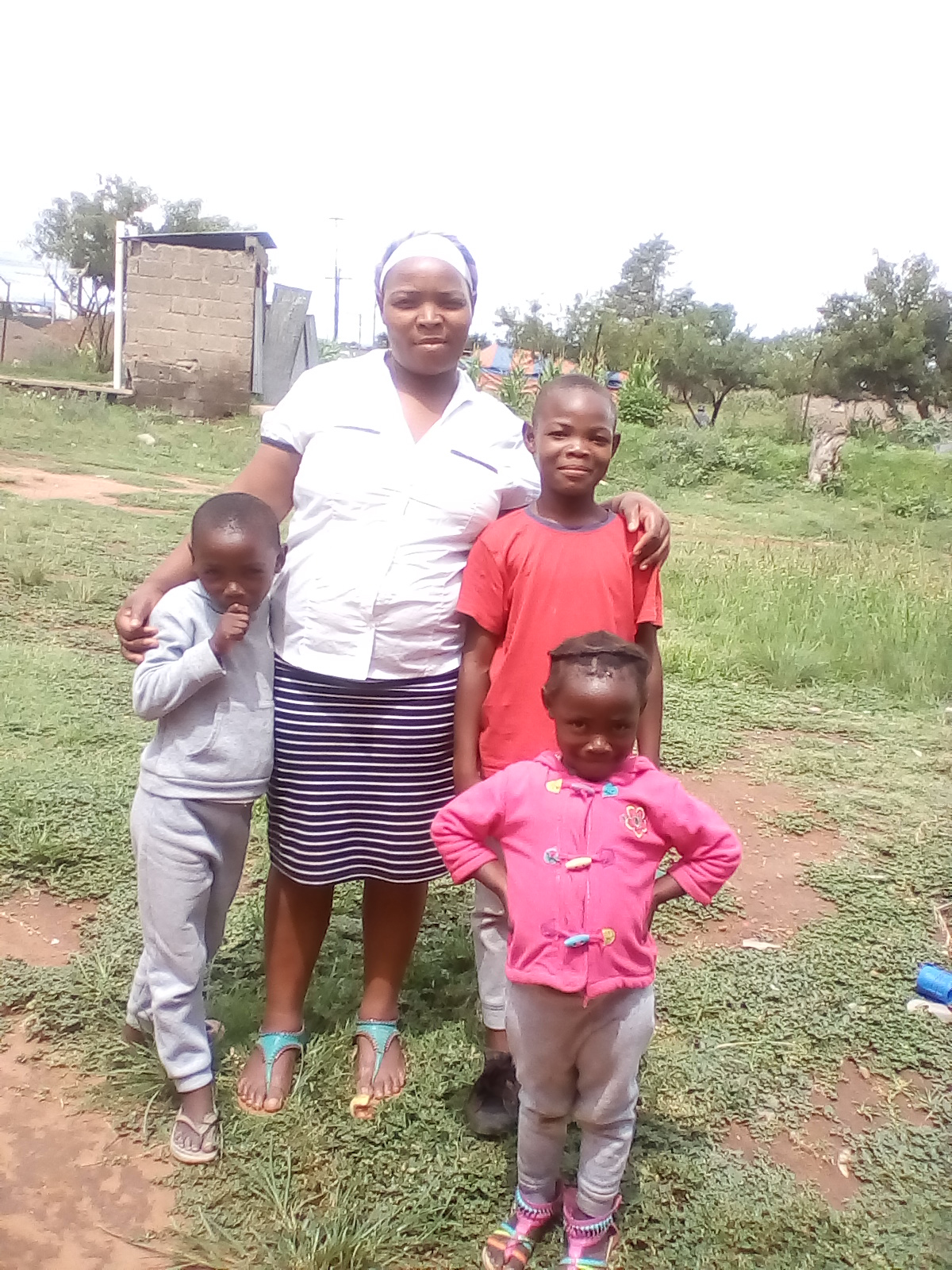
Mathapelo Mojau with her children. Image Sechaba Mokhethi
Unlike Molato 30-year-old Mathapelo Mojau, who works for a Chinese-owned factory in the Thetsane Industrial Area, found some financial security when she became a factory worker five years ago. She had been a fruit vendor on the streets of Maseru, but regularly ran at a loss as her stock often decayed before it could be sold.
“Working at the factories is a relief now because I don’t have to buy stock and neither do I have to worry about running losses because I have the assurance of a monthly salary,” she told Africa in Fact. But Mojau’s salary doesn’t stretch very far; it does not cover the educational needs of her three daughters. To fill the gap, Mojau normally borrows from co-workers’ informal saving schemes and loan sharks, “where we get ripped off 30% interest per month”.
Through their jobs, Mojau and Molato said they have access to workplace programmes that provide them with health education, subsidised health services, and free tuberculosis treatment.
The rise in employment in Lesotho’s apparel and textile industry hinges on a piece of US legislation – the African Growth Opportunity Act (AGOA) of 2001 – which provides beneficiary countries with duty- and quota-free access to US markets. The legislation attracted investments from China and Taiwan, and the subsequent inflow made Lesotho the largest sub-Saharan Africa exporter of garments to the US market (See Figure 1). According to the Lesotho Textile Exporters Association, in 2008 some 30% of sub-Saharan Africa garment exports, by value, were from Lesotho.
Chinese and Taiwanese factories pay $60 million a year in salaries and this money circulates through Lesotho’s economy, supporting a range of other small businesses. It also accounts for approximately one third of the country’s GDP. Around 43 of Lesotho factories exporting textiles and apparels to the US are owned by Chinese or Taiwanese migrants. The two nationals cooperate very well in Lesotho’s manufacturing sector yet their countries, China and Taiwan, officially have no relations.
“Taiwanese working more than 10,000 km from home would find it totally sensible and practical to seek protection and support from China’s diplomatic resources,” says Moeketsi Majoro, a former executive director for the International Monetary Fund (IMF). “Likewise, a country claiming sovereignty over both China and Taiwan would find it quite sensible to extend its support and protection.”
These two groups have shown reluctance to share their skills with the Basotho (the people of Lesotho). “The transfer of skills or technology has remained limited over the last two decades, as most of the high-value and management functions are based abroad,” explains Moshe Kao, an independent trade development consultant.
The US agreement (AGOA) then, clearly benefited the Asians and most of their profits are sent to their home countries. Researchers on Lesotho’s textile and apparel exports, Lorenzo Rotunno, Pierre-Louis Vézina and Zheng Wang said: “AGOA exports were in fact Chinese exports aimed for the US but transshipped through AGOA countries.” They add that Chinese and Taiwanese firms in Africa offer only assembly, packaging, and shipping services, while their Asian headquarters generate orders, design the clothes, and send fabric to Africa. (See Figure 2).
The proliferation of raw materials from China drastically increased Lesotho’s imports, eventually outweighing exports. This weakened Lesotho’s balance of payments, rolling back AGOA-related gains. According to a foreign trade statistics report, the kingdom has recorded a lingering trade deficit peaking at around -R14 million in 2013. Feng Fu Lung, the president of Sun Textiles, also in Thetsane, says Lesotho has been stuck in “cut, make and trim” mode for a long time. He has recommended a knit fabric mill, so local textile firms don’t have to shell out to import raw materials.
Joshua Setipa, Lesotho’s trade and industry minister, has since signed a $20 million agreement with the China-based Nien Hsing Group in November 2016 for the construction of two knit apparel factories to stop expensive imports. But this might not be enough to revive the kingdom’s apparel and textile industry. The political climate, job losses because of smaller orders from the US, and a crippling depression in the industry are likely to hamper the country’s economy. The workers’ futures, already looking bleak, will be further affected by whether Lesotho remains eligible for AGOA.
The country’s continued participation in AGOA rests on benchmarks set by the US. These include reforms on the constitution and in the public service sector. A sticking point however may be that Lesotho account for what has been described as an attempted coup – the army says it was a normal military operation – in 2014.
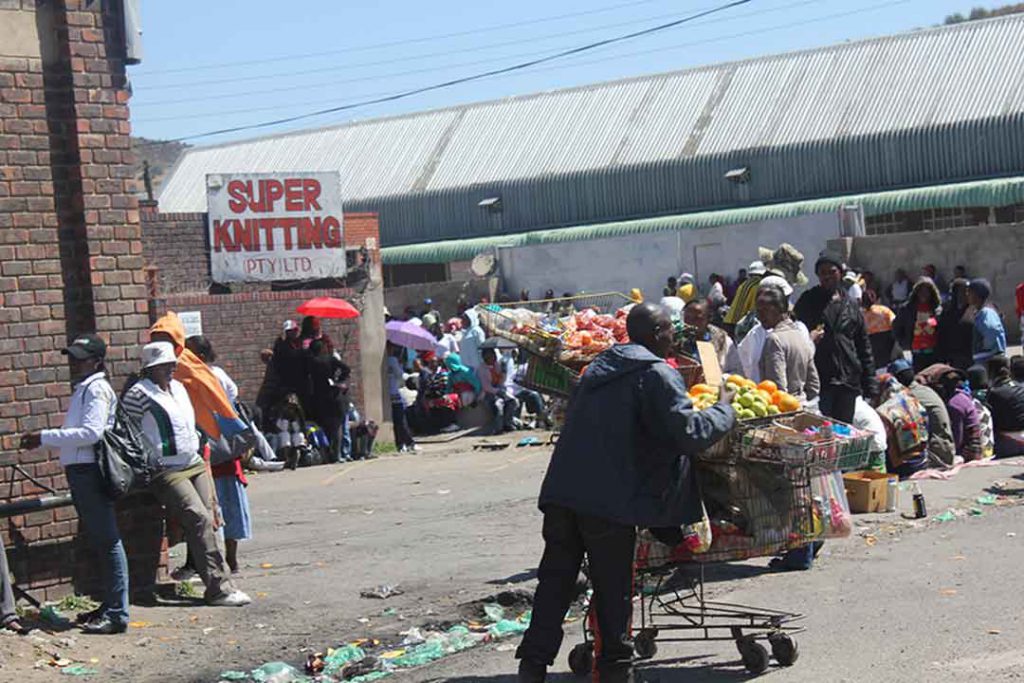
Job seekers at Super Knitting firm in Maseru Industrial Area. Image Sechaba Mokhethi
Correspondence between the US government and Lesotho followed, with the Americans insisting that Lesotho account for the incident. In early 2016, pressure mounted on the Lesotho government following a Southern African Development Community Commission of Inquiry into the murder of former army commander, Maaparankoe Mahao, shot by junior officers in June of 2015.
The inquiry’s recommendations included removing Lieutenant General Tlali Kamoli as head of the army, thorough investigations into Mahao’s death, and amnesty for detained mutiny suspects. The US tacked on these recommendations to its benchmarks for Lesotho’s AGOA eligibility.
In correspondence between Setipa and Michael Froman, then US trade representative on 17 January, Froman warned Setipa to meet all the benchmarks or face a review that might lead to Lesotho’s eviction from AGOA.
Despite the threat of eviction, Setipa has issued assurances that the country’s apparel and textile industry remains steadfast, but Molato is concerned that her job and others’ might be at risk if the government does not move to save them.
Molato and Mojau say there have already been retrenchments because of dwindling orders from the US. Production has also slowed, and the job losses started as early as March 2016.
Neither can do more than hope for the best as the two governments square off; but in the meantime Chinese and Taiwanese factories continue churning out Asian exports through the AGOA loophole.
Sechaba Mokhethi is a co-founder of MNN Centre for Investigative Journalism in Lesotho and a freelance journalist. He is Lesotho correspondent for South Africa-based African Independent and for The Southern Times (Namibia). He also contributes stories for IDN IndepthNews, a flagship of International Press Syndicate. Deputy secretary general for the Media Institute of Southern Africa-Lesotho, he holds a BA degree in political science and public administration from the National University of Lesotho.

